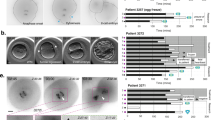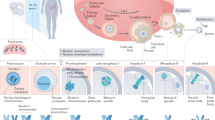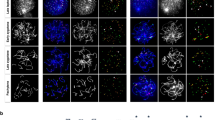Abstract
SEVERAL chromosomal abnormalities have recently been described in human cytogeneties, some of them probably directly and causally related to certain phenotypical effects. All this work was carried out using chromosomes of the mitotic metaphase, mostly from cultures of various cells. The exact identification of any single chromosome is not possible. All 42 autosomes and a pair of sex chromosomes are divided into four or five morphological classes using the length of arms and the position of the centromere as a landmark of identification. The difficulties may be illustrated by the fact that the sex of an individual is determined as male if there is an uneven number of small chromosomes. There is a great need for a more precise method of identification by which individual chromosomes can be recognized.
This is a preview of subscription content, access via your institution
Access options
Subscribe to this journal
Receive 51 print issues and online access
$199.00 per year
only $3.90 per issue
Buy this article
- Purchase on Springer Link
- Instant access to full article PDF
Prices may be subject to local taxes which are calculated during checkout
Similar content being viewed by others
Author information
Authors and Affiliations
Rights and permissions
About this article
Cite this article
SLIZYNSKI, B. The Pachytene Stage in Mammalian Oocytes. Nature 189, 683–684 (1961). https://doi.org/10.1038/189683a0
Issue Date:
DOI: https://doi.org/10.1038/189683a0
This article is cited by
-
A Pachytene map of the mouse oocyte
Chromosoma (1980)
-
Patterns of RNA synthesis in early meiotic prophase oocytes from fetal mouse ovaries
Chromosoma (1978)
Comments
By submitting a comment you agree to abide by our Terms and Community Guidelines. If you find something abusive or that does not comply with our terms or guidelines please flag it as inappropriate.



